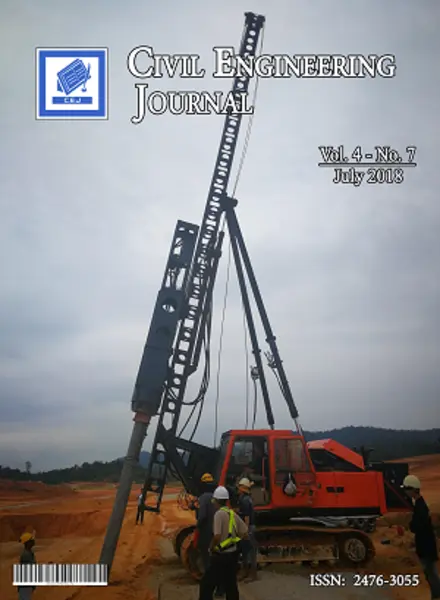-
compressive strength prediction of self-compacting concrete incorporating silica fume using artificial intelligence methods
جزئیات بیشتر مقاله- تاریخ ارائه: 1400/08/01
- تاریخ انتشار در تی پی بین: 1400/08/01
- تعداد بازدید: 437
- تعداد پرسش و پاسخ ها: 0
- شماره تماس ژورنال: 982188779475ext.258
this paper investigates the capability of utilizing multivariate adaptive regression splines (mars) and gene expression programing (gep) methods to estimate the compressive strength of self-compacting concrete (scc) incorporating silica fume (sf) as a supplementary cementitious materials. in this regards, a large experimental test database was assembled from several published literature, and it was applied to train and test the two models proposed in this paper using the mentioned artificial intelligence techniques. the data used in the proposed models are arranged in a format of seven input parameters including water, cement, fine aggregate, specimen age, coarse aggregate, silica fume, super-plasticizer and one output. to indicate the usefulness of the proposed techniques statistical criteria are checked out. the results testing datasets are compared to experimental results and their comparisons demonstrate that the mars (r2=0.98 and rmse= 3.659) and gep (r2=0.83 and rmse= 10.362) approaches have a strong potential to predict compressive strength of scc incorporating silica fume with great precision. performed sensitivity analysis to assign effective parameters on compressive strength indicates that age of specimen is the most effective variable in the mixture.
حوزه های تحت پوشش ژورنال
مقالات جدیدترین رویدادها
-
استفاده از تحلیل اهمیت-عملکرد در ارائه الگوی مدیریت خلاقیت سازمانی و ارائه راهکار جهت بهبود
-
بررسی تاثیر ارزش وجوه نقد مازاد بر ساختار سرمایه شرکت های پذیرفته شده در بورس اوراق بهادار تهران
-
بررسی تأثیر سطح افشای ریسک بر قرارداد بدهی شرکت های پذیرفته شده در بورس اوراق بهادار تهران
-
بررسی تأثیر رتبه بندی اعتباری مبتنی بر مدل امتیاز بازار نوظهور بر نقد شوندگی سهام با تأکید بر خصوصی سازی شرکت ها
-
تأثیر آمیخته بازاریابی پوشاک ایرانی بر تصویر ذهنی مشتری پوشاک ایرانی (هاکوپیان)
-
بررسی نقش خودکارآمدی کنترل احساس، علائم افسردگی و استرس پس از سانحه بر خطر ابتلا به خودکشی در میان نوجوانان شهرستان کرمانشاه
-
برآورد حدود آتربرگ رس های مورد استفاده در هسته رسی سدها با استفاده از شبکه های عصبی مصنوعی (مطالعه موردی: منبع قرضه هسته رسی سد مخزنی آغ چای)
-
جهت های جغرافیایی مطالعات اجتماعی پایه چهارم ابتدایی
-
تعیین فشار، تنش موثر و شتاب در راستای قائم تونل مدفون در خاک ماسه ایی تحت تاثیر انفجار سطحی
-
on the behavior of nitrogen in a low-ni high-mn super duplex stainless steel
مقالات جدیدترین ژورنال ها
-
مدیریت و بررسی افسردگی دانش آموزان دختر مقطع متوسطه دوم در دروان کرونا در شهرستان دزفول
-
مدیریت و بررسی خرد سیاسی در اندیشه ی فردوسی در ادب ایران
-
واکاوی و مدیریت توصیفی قلمدان(جاکلیدی)ضریح در موزه آستان قدس رضوی
-
بررسی تاثیر خلاقیت، دانش و انگیزه کارکنان بر پیشنهادات نوآورانه کارکنان ( مورد مطالعه: هتل های 3 و 4 ستاره استان کرمان)
-
بررسی تاثیر کیفیت سیستم های اطلاعاتی بر تصمیم گیری موفق در شرکتهای تولیدی استان اصفهان (مورد مطالعه: مدیران شرکتهای تولیدی استان اصفهان)
-
رویکرد داده کاوی برای برنامه ریزی فرآیند مبتنی بر دانش
-
بررسی نقش رهبری معنوی بر چابکی سازمانی
-
بررسی تأثیر مالکیت نهادی بر نوسان پذیری قیمت و بازدهی سهام
-
بررسی پیش آینده ای برداشت از سیاست سازمانی
-
structural behavior of pipelines buried in expansive soils under rainfall infiltration (part i: transverse behavior)


سوال خود را در مورد این مقاله مطرح نمایید :